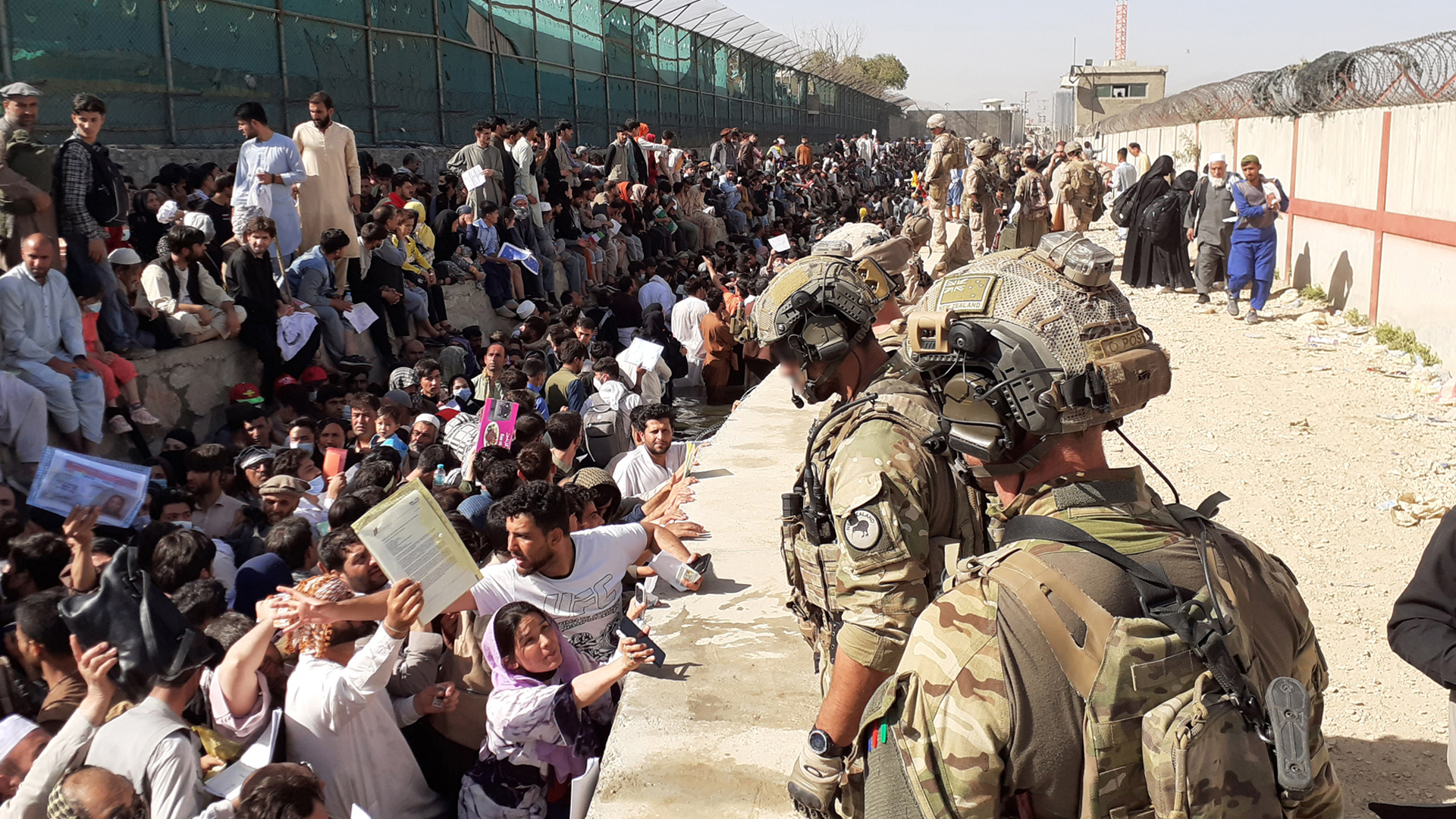

The Marines tasked with guarding Abbey Gate at Hamid Karzai International Airport were horribly exposed, but so many other partner nations were using the gate for their own evacuation efforts that it was impossible to coordinate with them all, according to 82nd Airborne Division Command Sgt. Maj. David R. Pitt.
“I know that if Golf Company had the gate by themselves that is not how they would have run the gate,” Pitt said. “If they could have, they would have shut that gate down, but they couldn’t because there were so many countries. If you had been there, you would have seen that an attack was coming. It wasn’t imminent, but it was a high probability.”
On Aug. 26, a suicide bomb attack at Abbey Gate killed 13 U.S. service members and up to 170 Afghans. Pitt, who was later interviewed for a U.S. Central Command investigation into the attack, said the security situation at Abbey Gate was untenable because “other countries were just walking through with evacuees, and we didn’t know who they were.”
“I don’t fault the Marines for that,” Pitt said for the investigation, which CENTCOM posted online following a Freedom of Information Act request. “The Marines at North Gate were very scripted. They had a serpentine, minimized area that would have reduced exposure to an attack. Abbey Gate just had a large parking lot of people, there were people sitting inside the checkpoint under cover that had been there for days waiting. There was no methodical checking system like there was at North or West Gate. To me, that is the failure. I don’t want to say the attack was inevitable but that was where the risk was.”

Although the Marines were guarding Abbey Gate, the presence of troops from partner nations there effectively meant that “everyone” was responsible for security, Pitt said. The Marines had a Mine Resistant Ambush Protected vehicle at the gate. It was the demarcation line between order and chaos. Between 20 and 50 meters beyond the vehicle, the area was “out of control,” he said.
“Marines at other gates may have been at risk one at a time, but not 30 people at a time the way they were at Abbey Gate,” Pitt said. “The Marines were just trying to make order out of chaos, they had to rely on the other host nations to check their people.”
CENTCOM’s investigation determined that one reason why the Marines were so exposed was that they were focused on getting as many people as possible through Abbey Gate.
“Any time spent emplacing obstacles was time not spent searching and screening civilian evacuees,” according to the investigation. “Additionally, many force protection measures that could have been implemented, such as additional T-Walls or HESCO barriers, would have inherently reduced the flow of evacuees.”

Yet Pitt said the security problems at Abbey Gate were glaringly apparent when he visited it the day before the suicide bomb attack.
“You couldn’t identify friend from foe, there were people sleeping on cardboard inside the holding area, just waiting,” Pitt said. “At that point, faces and bags become familiar so you lose situational awareness. Everything started to look normal after 3 or 4 days because that is the situation they were in at that gate.”
Pitt was not alone in his dire assessment. A soldier with the 1st Brigade Combat Team, 82nd Airborne Division, whose name was redacted from the investigation said the Marines were urging that Abbey Gate be closed prior to the attack.
In fact, Marine Brig. Gen. Farrell Sullivan, who led the joint task force crisis response at Kabul Airport, had wanted to close Abbey Gate on the evening of Aug. 25, but British forces at the nearby Baron Hotel were unable to finish their evacuation efforts by then, the investigation found.
Maj. Gen. Christopher Donahue, commander of the 82nd Airborne Division, told investigators that he originally decided to keep Abbey Gate open until 9 a.m. on Aug. 27 after British Brig. Gen. James Martin told him that his troops needed more time.

“He told me that they were going to try to keep pulling people out, and he wanted to know if I thought that we could keep the gate open,” Donahue said. “I told him that we would conduct a site survey since we were going to take over that gate. And we were interested to know if we could keep Abbey open, since North Gate was obviously dangerous at that time.”
Investigators concluded that closing Abbey Gate before Aug. 26 would have isolated British forces and could have led to a conflict with the Taliban.
Moreover, the investigation found that the suicide bomb attack could not have been prevented without U.S. troops taking measures to limit the flow of evacuees into the airport “and potentially risk mission failure.”
Still, Pitt said that he and Donahue could see that Abbey Gate and the Baron Hotel were vulnerable to a possible attack.
“The day after MG Donahue and I visited, we said that we were going to shut that gate down,” Pitt said. “It was so chaotic. People knew that gate was their opportunity to leave and they exploited it. Unfortunately that was at the cost of the Marines.”
What’s hot on Task & Purpose
- The bitter debate over the Army’s fleece jacket is finally settled
- How ‘Starship Troopers’ inspired Jim Mattis to make infantry training more realistic
- ‘Cold, isolated, and stretched thin’ — Why so many airmen hate Minot Air Force Base
- Veterans donated to a woman who said she was a Marine combat vet dying of cancer. It was all a lie.
- An Air Force general openly shared his mental health appointment: ‘Warrior heart. No stigma’
Want to write for Task & Purpose? Click here. Or check out the latest stories on our homepage.
